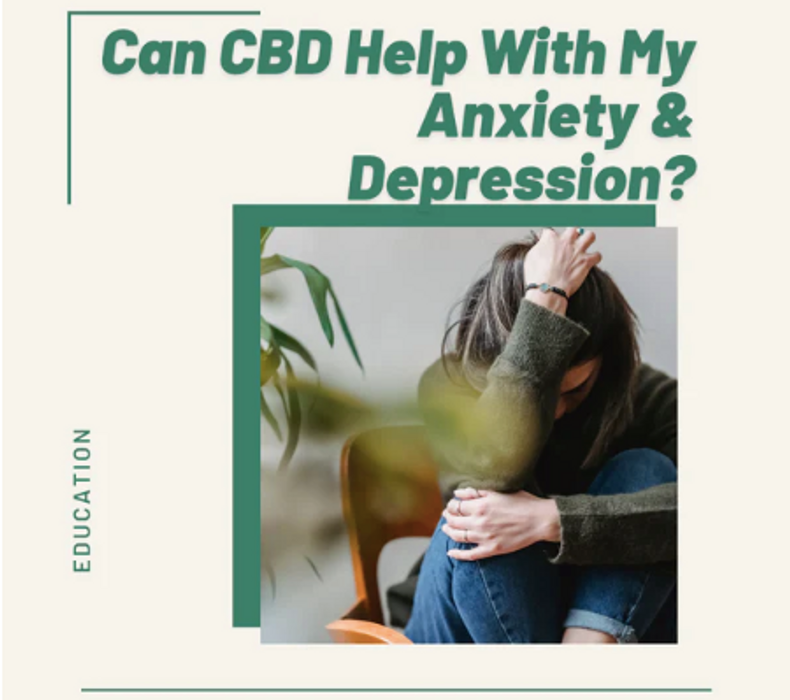
Can CBD Help With Anxiety and Depression?
"I’ve been struggling with strange anxieties for most of my life. As a child, I would make myself physically ill with nerves for any social gathering or family event. Branded as a highly emotional worrywart, it wasn’t until later in life that it was recognized as anxiety.
After an entire lifetime of obsessive worrying, prescribed medicating, and self-medicating with little success, I was skeptical about trying anything else. I assumed I was destined to live an anxious lifestyle. I had let my anxiety turn into a sheer terror of being alive, I couldn’t get onto a city bus, I couldn’t walk into a lecture hall, I couldn’t sleep, I couldn’t move most days. My mind was full of obsessive questions that had no relevance being there, thoughts that I felt I couldn’t control. It very rapidly morphed into an inability to speak to people plus a general disdain for those who seemed so lucky to be able to function properly. I reclused and lived like this for years, full of fear and inadequacy and absolutely all the power to change it.
I knew I needed to call a therapist and I cried at the thought of it, I couldn’t even think of the last time I spoke to someone on the phone. I continued to avoid it obsessively. I would wake up with dread every morning thinking about making a single phone call for help. I knew how absurd it was that I was forcing myself into emotional misery over something I could have just gotten over with, but I couldn’t do it. Anxiety turns simple tasks into life-altering, paralyzing decisions.
Various emotional, messy, confusing events over the years lead to a fun bout of inevitable depression and a handful of therapists. So it goes, it got much worse before it got any better. To heal anxieties, I had to do things that made me more anxious than I had ever been in my life. Some of the most critical turning points for me were therapy, transitioning away from pharmaceuticals, heavy THC consumption, and finally getting some sleep.
THC has so much medicinal potential and is great as a short-term crutch for mental health, but with prolonged use over time, I felt it was doing more harm to my mental health than good. I replaced my THC consumption with CBD & CBN. I consumed 100mg of CBD throughout the day and 15mg CBN at night. Until recently, I would wake up every hour, on the hour, due to a tremendous fear of oversleeping, therefore significantly increasing my chances that I would oversleep. Anxiety is a vicious cycle but using CBN has transformed my nights. A rested mind doesn’t panic nearly as often.
A high CBD intake allowed me to slow down and more calmly process and sort through my thoughts. Incorporating a consistent and balanced cannabis regimen isn’t going to melt away your anxieties, but it will allow you to think about them differently. I’ve had more than enough trial and error with medication and techniques. As opposed to cannabis being your last resort, I’d sincerely, from the bottom of my anxiety-ridden heart, recommend it as your first choice." - Hilary, District Manager Happy Trails
Can CBD Help with My Anxiety and Depression?
Anxiety and depression are among the most common mental health conditions in the world. In the United States, it’s estimated that about 40 million people suffer from some form of anxiety disorder, while over 16 million people suffer from depression.[1] These numbers are staggering, and they’re only going to get worse as time goes on. So, what’s the solution? For a lot of people, it’s CBD. It’s possible that CBD could be the answer for many people suffering from anxiety and depression.
Before we talk about how CBD may help you if you are suffering from depression or anxiety, we have to answer a couple of questions; What is CBD? What is your Endocannabinoid System? How are your ECS and CBD linked together?
What is CBD?
Cannabidiol (CBD) is a naturally occurring compound found in the “hemp” version of the cannabis plant. Hemp refers to a cannabis plant with 0.3 percent or lof THC. The Cannabis plant has an abundant history as a medication going back thousands of years. The therapeutic properties of CBD are being tested and validated by scientists and medical professionals all over the world. A safe, non-addictive substance, CBD is among more than a hundred "phytocannabinoids" unique to cannabis and endow the plant with its therapeutic profile.
CBD is closely related to another active phytocannabinoid found in cannabis: tetrahydrocannabinol (THC), which is the substance that triggers the high feeling that has made marijuana is famous. These are the two parts of cannabis that scientists have most studied.
Both CBD and THC have considerable therapeutic attributes. CBD does not make an individual feel "stoned" or “high” because CBD and THC act differently on different receptors in the brain and body.
CBD can minimize or neutralize the psychedelic effects of THC, depending upon how much of each compound is taken. Lots of people desire the health benefits of cannabis without the high. Because CBD is easy to take as a CBD oil and is non-intoxicating while having potent therapeutic properties, it is an appealing treatment option for people cautious about trying cannabis for the first time.
What is your Endocannabinoid System?
The Endocannabinoid System (ESC) is a biological system that plays a significant role in regulating various processes in the human body. Research [2] has linked the ESC to many processes, including:
- Appetite and digestion
- Chronic pain
- Stress
- Reproductive system function
- Sleep
- Mood
- Inflammation
- Metabolism
The processes that the ECS is linked to all contribute to the homeostasis of your body. Homeostasis is defined as “the tendency toward a relatively stable equilibrium between interdependent elements, especially as maintained by physiological processes.”
This means that all these different functions work together to maintain a level of stability in our bodies. When an outside force is acted upon the body, such as pain from an injury, you no r endocannabinoid system kicks in to get you back to that optimal operating level.
There are three critical components of the endocannabinoid system: endocannabinoids, receptors, and enzymes. The two most studied cannabinoid receptors are CB1 and CB2 receptors. CB1 receptors are primarily found in the brain and central nervous system, while CB2 receptors are mainly found in the peripheral organs, especially cells associated with the immune system. However, both receptors can be found in all parts of the body.
Endocannabinoids or endogenous cannabinoids are naturally produced molecules that interact and bind to cannabinoid receptors. CBD and THC, and other cannabinoids found in cannabis interact with these receptors the same way that endogenous cannabinoids produced naturally in your body do. The final part of the ECS is the enzymes. Thye is there breaking down the endocannabinoids after they have been used and are no longer needed.
CBD for Anxiety and Depression
Looking at a 2015 review[4], researchers were interested in using CBD oil to treat different anxiety disorders. After review existing studies, the review found that preliminary evidence supported the use of CBD oil for generalized anxiety disorder, social anxiety disorder, panic disorder, and post-traumatic stress disorder. The review notes that studies used CBD oil for acute anxiety appearing quickly and intensely. Few studies had been done on chronic anxiety at the time of the review.
A 2019 study[3] concluded that CBD oil has a calming effect on the central nervous system and may hold benefit for anxiety-related disorders. After assessing the impact of CBD oil on 72 people with anxiety, researchers found it reduced anxiety in 79.2% of the study participants within the first month. Only three individuals did not tolerate the CBD oil well.
With the number of clinical tests being conducted with CBD and cannabis continuing to grow, a more precise understanding of how CBD can help individuals manage their anxiety and depression continues to evolve.
Conclusion
CBD is a popular, natural form of medicinal marijuana that has tons of health benefits. That’s why it’s so popular among the cannabis community. Not only is CBD an excellent, natural treatment for anxiety, but it also has many health benefits that are anti-inflammatory, anti-microbial, anti-cancer, anti-cholesterol, and anti-tumor. However, because CBD is a natural cannabinoid, its medical services have not yet been thoroughly studied. For this reason, CBD can’t be prescribed by doctors like they can other medications, but it also has a great deal of power to help those who have anxiety and depression. It could very well be the solution for many people who are suffering from anxiety.

